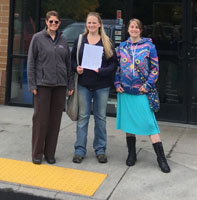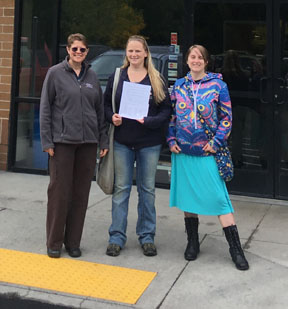
CRVS 288

Photo courtesy of Kat Bennett
From left, Kat Bennett and fellow union organizers Beth Wood and Melissa Cox stand in front of Columbia River Veterinary Specialists in Vancouver, Washington, on Sept. 18, 2018, the day they presented to management their intent to unionize. Bennett and Wood are licensed veterinary technicians; Cox is a doctor’s assistant.
Support staff at Columbia River Veterinary Specialists in Washington state have ratified what they believe is the first union contract at a private veterinary hospital, two years after they voted to form a union and following protracted negotiations.
Union members at the emergency and specialty care facility voted 53 to 1 to approve the contract, according to an Aug. 13 announcement by the International Longshore and Warehouse Union (ILWU), of which they are a part.
“The vote shows the bargaining committee did an amazing job representing others,” said Liz Hughston, a registered veterinary technician and founding member of the National Veterinary Professionals Union, which is helping support staff organize at other hospitals.
The contract establishes wages, benefits and workplace rights for about 75 support staff, including veterinary technicians, assistants, maintenance personnel and customer service representatives. It is retroactive to Jan. 1.
Columbia River Veterinary Specialists is owned by PetVet Care Centers, a private-equity-backed consolidator with more than 260 hospitals in 29 states, according to its website. VIN News Service calls to PetVet were not returned.
“The most important thing was saving this industry, and making it something you want to be in in the long term,” said Kat Bennett, a licensed veterinary technician specializing in internal medicine. Bennett was active in the earliest stages of organizing the union and is now a shop steward.
The challenges faced by veterinary support staff — veterinary technicians in particular — are long-standing and well-known in the veterinary community: They include low pay, lack of respect and stressful work environments.
Bennett counts wage increases, a top priority identified by colleagues, as one of the contract’s big wins.
The contract establishes a base rate of pay for all support staff position classifications, which did not exist before. In addition, wages are now transparent; and raises are uniform and automatic, according to information provided by ILWU. Cost-of-living increases will be 3% in 2021 and 2.5% in 2022 and 2023.
Hughston said employees would see, on average, a 17% increase in pay during the 3 ½-year contract. Bennett reported that she has had one pay raise of 2.5% in the past four years.
The contract establishes certain workplace rights, including layoff and recall procedures based on seniority. In addition, a “just cause” standard replaces “at will” termination. Formerly, an employee could be fired without reason or warning. Under a just-cause standard, employers must provide warning and a reason for termination; employees have avenues for challenging the termination.
Bennett also pointed out that paid-time-off accrual was expanded under the contract and, in a change from previous policy, employees will not forfeit accrued paid time off when they resign but will receive the money in their final paycheck.
The contract also expands the employee assistance program, such as by providing at least three counseling sessions per year. “That’s very important in this industry,” Bennett said, alluding to the emotional stressors inherent in the job.
The contract establishes union dues equal to 1.8% of wages. Dues will not be collected until a worker has received at least 4% in wage increases.
Bennett noted that the union didn’t get everything it wanted, such as hazard pay during the pandemic. She also said the process was arduous. “It felt like a long time because our industry is tough,” Bennett said. She explained that during negotiations, several staff members left for other jobs, and momentum flagged.
For Hughston, a key measure of the contract will be how things look in six months. “Will people be more likely to want to work there?” she asked. In an industry that she called "woefully understaffed," she predicts that union benefits will help attract and retain support staff and spark a change of hospital ownership attitude in general.
Slower progress for unions at Mars-owned hospitals
Columbia River Veterinary Specialists, which voted to form a union in October 2018, leapfrogged three other West Coast hospitals in the quest for a contract.
VCA San Francisco Veterinary Specialists was the first veterinary hospital to join ILWU in April 2018. Its bargaining efforts have been punctuated with strikes and walkouts.
Owned by the privately held international conglomerate Mars Inc., VCA is among the largest hospital chains in North America, with more than 1,000 hospitals operating in the U.S., Canada and Japan.
A second VCA hospital, Northwest Veterinary Specialists in Clackamas, Oregon, voted to join the ILWU in July 2018. Due to a challenge by ownership, that union election was not certified until March 2019.
In May 2018, BluePearl Specialty and Emergency Pet Hospital in North Seattle voted to unionize as part of the National Veterinary Professionals Union. Also owned by Mars, BluePearl operates more than 90 hospitals in the U.S.
Bennett said the approved contract could be a beacon to sister unions. “They are happy there’s been a precedent,” she said. “We are showing it’s possible.”